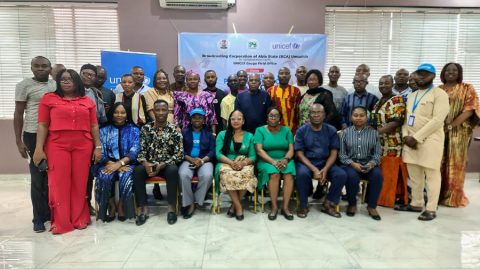World Hand Washing Day: UNICEF To Partner Media In Promoting Hygiene Habit
Featured, Latest Headlines, News Across Nigeria Friday, October 18th, 2024
(AFRICAN EXAMINER) – The United Nations Children’s Fund (UNICEF) Enugu Field Office, has emphasized the need for Nigerians to always embrace hand washing practice, saying it remains a Cornerstone for disease prevention, just as it solicited for robust partnership with the media in promoting the habit.
As a catalyst development partner, the organization assured that it would continue to support global handwashing practice.
UNICEF chief of field office Enugu, Mrs Juliet Chiluwe, stated this in a goodwill message during a one day South East media briefing on the 2024, Global handwashing put together by the children friendly organization in collaboration with Broadcasting Corporation of Abia, BCA, in Enugu.
Our correspondent reports that the Theme for this year’s celebration “Why are clean hands still Important?’” is also aimed at driving home the need and importance of the practice.
“I want to emphasize the significance of this simple yet powerful act in safeguarding our health and well-being.
“Handwashing is a cornerstone of disease prevention, and its impact on public health cannot be overstated. It is a simple yet incredibly effective way to prevent the spread of diseases and protect public health.
Chiluwe, who spoke through the monitoring for result (MR), and officer in charge OIC, Unicef Enugu field office, Mrs. Maureen Zubie-Okolo, said that they are “committed to promoting hand hygiene among the communities we serve.
“We believe that by fostering a culture of handwashing, we can contribute to a healthier and safer world for all. UNICEF supports national handwashing campaigns and helps integrate handwashing into other existing programmes-like health, education and nutrition-in over 90 countries
‘Together with governments, we develop hand washing policies, strategies and action plans to promote handwashing and make services and supplies available.
“This includes hand hygiene in school policies and health-care facilities. In collaboration with the World Health Organization, we monitor handwashing in households, schools and health-care facilities around the world
According to her “UNICEF has supported hand hygiene initiatives to combat some of the worst epidemics, including ebola and cholera, for many years.
“Since the emergence of the global COVID-19 pandemic, UNICEF has scaled up hand hygiene efforts in various countries and regions through the Hand Hygiene for All Initiative.
“This sets ambitious targets for expanding access to hand hygiene in schools, health-care facilities, workspaces, displacement camps and other key areas of public Interest. Our global coordination with partners will help ensure countries hold on to the gains made in hand hygiene beyond the pandemic.
“All of society must work together to achieve universal hand hygiene. To move forward together we must understand where we stand.
“To support this, UNICEF and WHO launched a joint report, the State of the World’s Hand Hygiene, on Global Handwashing Day in 2021. This report is the first of its kind, bringing together hand hygiene critical data sets and insights to present the sector’s current status and highlight lagging progress, calling upon Member States and support agencies to action, and offering numerous inspiring examples of change across the SDG 6 accelerator themes.
“We call on governments to integrate and budget for hand hygiene in national response and resilience plans, as well as long-term development strategies. Donors should invest in programs that prioritize hand hygiene, promote access to hand hygiene facilities, and support public health and economic resilience.
“Suppliers should collaborate with governments, health systems, and NGOs to ensure sustainable supply chains for hand hygiene products.
“Businesses should prioritize hand hygiene for employee health and safety. Institutions should implement a multi-faceted approach for hand hygiene, including promotion, accessible facilities, regular monitoring, and behavior reinforcement.
“Lastly, academics should fill evidence gaps and translate research into practical resources for hand hygiene intervention and program development.
In a presentation, the UNICEF WASH specialist, Mrs Rebecca Gabriel while stressing the need to have constant hand washing, added that engaging in the practice regularly was capable of reducing diarrhea by 30%, and could equally reduce acute respiratory infection by 20%.
Tropical diseases she noted, such as elephantiasis, which are endemic in many places in Nigeria, could also be curbed via regular hand washing.
The specialist hinted that 83% of the Nigerian population lack proper hand washing facilities and as a result, many people are suffering from communicable diseases.
As a solution to check the diseases caused by not embarking on regular hand washing, Mrs. Gabriel called on governments to increase budgetary allocation for hygiene as well as provide adequate water for drinking and other purposes.
She however, expressed worry that in the South East geo-political zone of the country alone, about 3.6 million households do not have toilet facilities, thereby indulging in open defecation that eventually permeates into water fountains and streams.
Acting Managing Director MD, Enugu State Rural Water Supply and Sanitation Agency, EN-RUWASSA, Ms Chika Mbah, who was represented by Chioma Dick-Emmanuel, Technical Adviser TA, WASH EN-RUWASSA, stated that the importance of hand washing cannot be overemphasized because it was through hands that diseases can pass into people’s bodies.
She said it is only healthy people that can be financially productive, adding that, “we are here to motivate everyone to embrace the life saving practice of hand washing. Together we can make a lasting impact on the society,”
UNICEF, Communications officer, Dr. (Mrs) Ijeoma Onuoha Ogwe, who highlighted objective of the media briefing, explained that the organization and its partners convened the media outing with a view to providing the Journalists with facts on true state of Handwashing in the country, South East inclusive, so as to enable them begin to change the narrative through their reportage in various media channels.
She described the media as key stakeholders and worthy partners with the capacity to change the story for good.
Also speaking, Acting Managing Director of BCA, Mr. Francis Nwaubani represented by Okezie Akpa, expressed appreciation to the media for always partnering with Unicef on issues affecting the society, including health.
He said his organization would continue to be at the forefront in driving the message of promoting Handwashing practice in Abia state for the good of the people.
Related Posts
Short URL: https://www.africanexaminer.com/?p=98451






















